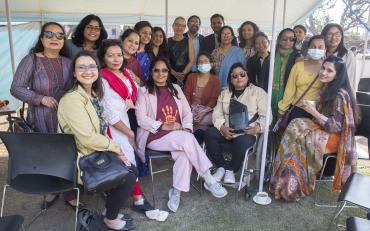The Swiss Disability and Development Consortium (SDDC) - comprised by CBM Switzerland, the International Disability Alliance (IDA), FAIRMED and Handicap International Switzerland (HI) - commissioned the Photovoice Study on Women with Disabilities in Nepal.
This is a participatory study ‘My lens, my reality’ was coordinated by the Interdisciplinary Centre on Gender Studies at the University of Bern in partnership with the Kathmandu University. The study examines the situation of women with disabilities in Nepal, with a focus on the barriers and enablers to their inclusion. Nepal is a priority country of Swiss development cooperation, which is the main focus of the SDDC.
IDA was present in Kathmandu to the launch ceremony of the Photovoice Study and Photo Exhibition and congratulates all women with disabilities, DPOs and partners involved in that Study.
During the ceremony, Her Excellency Ambassador Elisabeth von Capeller, Swiss Ambassador to Nepal, opened the event recalling that very often, disability is overlooked in many programs. She highlighted that this year the best way to commemorate International Women’s Day was used with this joint collaboration.
Suraj Sigdel, CBM Global Country Director in Nepal, representing the SDDC in Nepal, stressed that the Photovoice Study is a unique method to study the barriers and enablers of women with disability. He further added that the study has provided a way to replicate the methodologies in other areas of work.
Sony KC, one of the Researchers from the Kathmandu University and involved in the Study, presented the outcomes of the report. The methodology of study included 10 women with disabilities who were selected as a part of the project to take photographs of their everyday lives and they use these same photos to tell stories about how they consider their lives in terms of barriers and enablers. From the study, it is found that stigmatization and multiple discrimination, lack of accessibility, disability-related extra costs, lack of self-confidence are the underlying factors of social, economic, and political exclusion.
Meena Paudel, General Secretary of Nepal Disabled Women Association, shared the perspectives of women with disabilities and remaining challenges. She recommended that collaboration and coordination between organizations are critical for upcoming days.
Rashmi Amatya, one of the Deaf women that participated in the PhotoVoice study, shared her pleasure in participating in the study and learning about photography and related stories.
The ceremony was concluded with the audience observing the photo exhibition in the gardens of the Swiss Embassy in Nepal.
